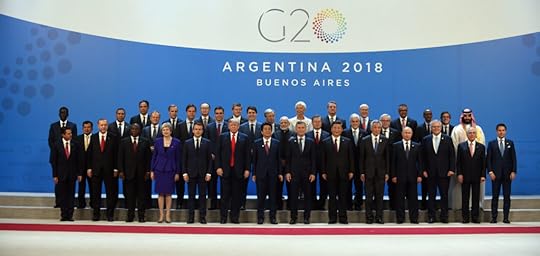Every Nation for Itself – Book Review

Every Nation for Itself: Winners and Losers in a G-Zero World by Ian Bremmer published by Portfolio Penguin in 2012.
The book was written by Ian Bremmer which was also the
author of ‘The End of the Free Market’. In this book, Bremmer put forward his
thesis that the world is moving toward a leaderless world, a world where no
single nation or group of nations can impose anything to other states to
coordinate international respond and solve global problems. He termed this new
world G-Zero, as opposed to the grouping of established power which created a
club G7- a club of 7 powerful nation.
The G7 has diminishing power as the U.S. power slowly wane
off and the EU disintegrates, while a much larger club like the G20 produces
nothing of substance. On contrary, we have a number of emerging nations
assuming greater economic and political power on the global arena, but none of
them was capable or willing to assume global leadership.
One of the areas which are crucial for the survival of our
planet is on the issue of global warming. This global problem cannot be solved
by individual nation, it needs a coordinated and planned international effort.
Copenhagen climate summit in 2009, for example, produced nothing substantial to
come up with a global solution. India and China unwilling to cut emission that
will hamper their economic development, they instead remind western counterpart
that today’s problem was the result of the western industrial revolution, and
they are the one who needs to foot the bill.
Bremmer explained that the waning of American global
dominance is due to their swelling debt. With China on the rise, and the
Chinese willingness to invest in U.S. debt, it is harder for the U.S. to impose
anything on China. The U.S. also spending too much money on foreign war trying
to keep the world “peace, democratic and stable”. Although many would disagree
with Bremmer assessment, Chomsky for example once stated that the best way of
ending terrorism is by stop participate in one. One can argue that U.S. wars
were good or not, but no one can deny that it help dries the U.S. from the fund
it needs for productive economic development.
China also benefited from the service of U.S. navy patrol of
the major trade route but has no incentive to take over the lead. Russia on the
other hand, since the fall of the Soviet Union has lost military clout and the
ideological appeal for much of the developing world.
The book also is dense with ‘American exceptionalism’ which
made it non-objective and highly political. Some of it was not based on fact
but an assumption. For example, in discussing the Nuclear Non-Proliferation
Treaty (NPT), Bremmer wrote that “Iran join the club but cheat”. No evidence
cited for this accusation, instead, in
the following line he said Iran “generally assumes” to be hiding its nuclear
weapons program. So, this accusation is not based on fact but an assumption.
In discussing the US-China trade relationship, Bremmer
prediction turns to be not very far stretched, as China keeps Yuan devalued,
the trade war looms as the U.S. and China have already slapped tariff to each
other. China manufacturing strategies also seem to be working, especially in
the telecommunication industries which has put the Western counterpart unease,
the latest is the Huawei case.
Market forces were also discussed in the book, he connected
the dots and explain how these forces impacted the price of commodities. The
growing middle-class for example, given rise to the demand of meat-based diet.
This, in turn, will push the grain price up as grain is needed so much more to
nourish livestock rather than feeding human. The rising price of grain will hit
poor countries the most as they spend a large portion of their income on food,
whilst in rich countries, the food is highly processed and the price fluctuation
usually lost after adding other costs such as processing, manufacturing and
transportation.
Who are is the possible winner in the leaderless world?
To this question, Bremmer suggests that countries with broad
cooperation and does not rely on any single superpower will thrive. As there is
no single power can impose any standard global system, these emerging states
can play using their own rules. Countries like Brazil, Turkey are possible
winners, as does the African continent.
States which does not obey the American leadership (Bremmer
called it rogues states) which have powerful friends will also have a good
advantage in the leaderless world. As the U.S. is plagued by war fatigue,
Europe troubled with fiscal austerity, the military threat was seen less
credible whilst economic sanctions were ineffective and porous.
Who will be the losers?
To this Bremmer answered states that still hang on to the
old power structure. They resist changes and stick to their own rules and
institutions. Institutions that have already accomplished their mission but not
yet decommissioned, such as NATO will also be on the losing end.
Closing the book, Bremmer comes out with what the future
might look like. The future according to Bremmer depends on the U.S., China,
and the other countries. This book was written in 2012, whilst this review was
written in 2019. So, we already in the future and can look back at Bremmer
proposed image of the future.
Bremmer suggested 4 possibilities, judging from the current
world affairs the most suitable candidate will be the “Wold of Regions” where
the emerging countries become stronger whilst the U.S. and China relationship
becoming more hostile. We can see the trade war currently brewing between these
two superpowers, with tariff been imposed on each other and the growing tension
on Huawei expanding their technological reach. While other countries climbing
the global political ladder. Even the U.S. sanction on Venezuela is not working
as India continue to buy Venezuelan oil. Whilst Turkey ignored U.S. threat and
continue purchasing Russian missiles system.
Bremmer concludes the book on looking at the U.S. fate in the G-Zero world. He ends the book with his last touch of American exceptionalism saying that the U.S. always has a second act and can rise again. To do this they need to accept the world as it is and innovate to adapt.



